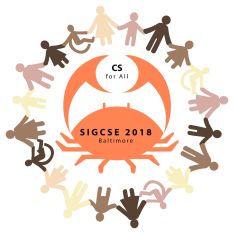 Our latest article “Developing Computational Thinking through a Virtual Robotics Programming Curriculum” was just published in the ACM’s Transactions on Computing Education journal!
Our latest article “Developing Computational Thinking through a Virtual Robotics Programming Curriculum” was just published in the ACM’s Transactions on Computing Education journal!
You can download the accepted, pre-publication version of the article here.
The link to the published version of record is here.
Abstract
Computational thinking describes key principles from computer science that are broadly generalizable. Robotics programs can be engaging learning environments for acquiring core computational thinking competencies. However, few empirical studies evaluate the effectiveness of a robotics programming curriculum for developing computational thinking knowledge and skills. This study measures pre/post gains with new computational thinking assessments given to middle school students who participated in a virtual robotics programming curriculum. Overall, participation in the virtual robotics curriculum was related to significant gains in pre- to posttest scores, with larger gains for students who made further progress through the curriculum. The success of this intervention suggests that participation in a scaffolded programming curriculum, within the context of virtual robotics, supports the development of generalizable computational thinking knowledge and skills that are associated with increased problem-solving performance on nonrobotics computing tasks. Furthermore, the particular units that students engage in may determine their level of growth in these competencies.
Citation:
Witherspoon, E.B., Higashi, R.M., Schunn, C.D., Baehr, E.C., Shoop, R. (2017). Developing computational thinking practices through a virtual robotics programming curriculum. ACM Transactions on Computing Education, 18(1), 20. doi: 10.1145/3104982
 Finally got my feet wet in the conference scene, by giving my paper talk titled “Developing Computational Thinking in a Virtual Robotics Programming Curriculum” at the Special Interest Group – Computer Science Education (SIGCSE) Conference in Baltimore, MD. Slides are available here.
Finally got my feet wet in the conference scene, by giving my paper talk titled “Developing Computational Thinking in a Virtual Robotics Programming Curriculum” at the Special Interest Group – Computer Science Education (SIGCSE) Conference in Baltimore, MD. Slides are available here.

